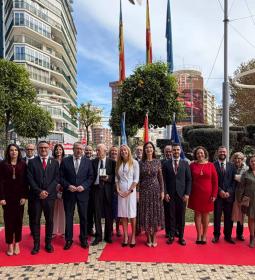The plenary session will give the green light to PACES, which arises from the adhesion of Benidorm to the Covenant of Mayors for Climate and Energy
Benidorm will approve the Action Plan for Climate and Sustainable Energy as a strategy for mitigation and adaptation to climate change

The plenary session of Benidorm will approve next Monday the Action Plan for Climate and Sustainable Energy (PACES), which will be the reference framework for the development of a comprehensive and coordinated strategy for mitigation and adaptation to climate change until the year 2030. This plan, whose document has already been drafted, is carried out by the City Council's adherence agreement to the 'Covenant of Mayors for Climate and Energy.
The PACES includes the lines of action to be developed by the different socioeconomic sectors of the city to have a basic planning instrument to promote coordinated and coherent action among them.
The plan stems from Benidorm's adherence to the Covenant of Mayors for Climate and Energy. It emerged from that pact with the commitment to present the PACES within two years and to carry out an inventory of reference emissions and an assessment of risks and vulnerabilities derived from climate change.
As explained by the mayor, Toni Pérez, "for the city it can be a great effort, but the fact of promoting a culture of energy saving through raising awareness among the population and the development of actions that make it possible to strengthen and improve the existing is very important to fight against climate change and make Benidorm a model to be followed by other municipalities”.
Thus, Benidorm is committed through the PACES to contribute locally to the mitigation of climate change, comply with current environmental and energy legislation and prepare for future scenarios of a restrictive nature. In addition, Pérez added, there are other objectives such as "improving our image, increasing the quality of life of our citizens, reducing energy consumption and the associated economic costs, increasing energy efficiency, protecting and preserving the environment for future generations, reducing greenhouse gas emissions and, ultimately, adapt to climate change”.
Regarding the climate change mitigation objectives for the year 2030, the mayor pointed out that the PACES establishes "achieving at least a 27% share of renewable energy in the municipality, a saving of 27% in the energy consumed and the 40% reduction in emissions generated by greenhouse gases”. For these climate change mitigation objectives, a total of 85 actions have been established.
The proposal to be approved in the plenary includes the preparation of a monitoring report, at least every two years, for evaluation, monitoring and control purposes.
According to the PACES, it is estimated that it will be necessary to invest a minimum of 3,353,221 euros in areas that depend directly on the City Council to achieve the goals set. As for the areas that do not depend on the City Council, it is estimated that this amount will amount to 6,429,030 euros.
For financing, the PACES proposes obtaining the resources "through its funds and European subsidies, since there are many of them that are available that are aligned with the objectives of the plan itself."
Lastly, PACES indicates in its conclusions that "there is a lot of progress as a result of the commitment and the strategy initiated years ago by this City Council to adapt to and combat climate change, for sustainability, the commitment to renewable energies and the efficiency in resource management” Pérez stressed.
In this sense, it is detailed that in the municipal dependencies in the year 2019 the consumption objectives set for 2030 had already been met. The same happens in the case of public and regional transport and in that of private and commercial transport "as a consequence of the mobility policies established in the municipality in recent years”.




